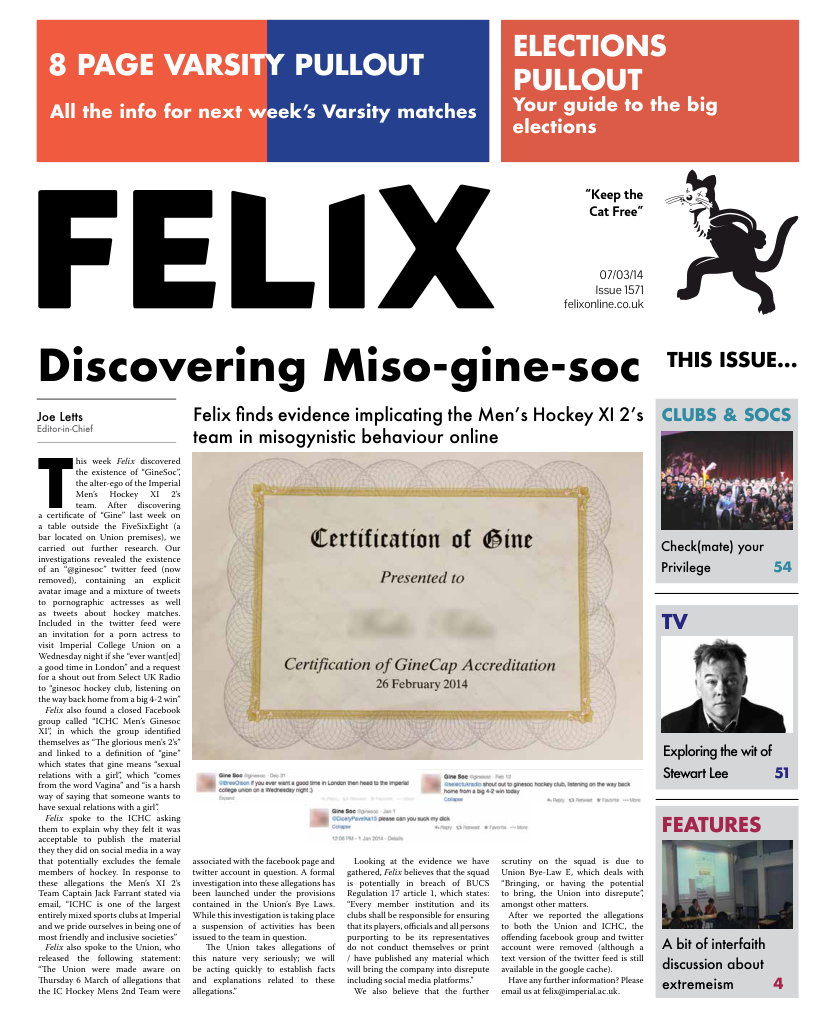Culture returns to the Idiots’ Lantern
Ryan Ehlers takes a ride in Stewart Lee’s Comedy Vehicle
I am culture,” declares a delusional and ranting Stewart Lee in the final episode of the new series of Comedy Vehicle, 30 minute episodes of stand-up comedy. He lists some admittedly impeccable credentials: books published by Faber and Faber(1) (“not Tesco’s own brand”), having co-written and directed an award-winning opera(2), having curated jazz festivals, and performed John Cage pieces to paying audiences. He does not count among these credentials the BAFTA that the second series of Comedy Vehicle won in 2010 for Best Comedy Program(3). This is perhaps unsurprising, given that in previous series he has denounced television as “the idiots’ lantern”, and Channel 4 as “like a flood of sewage that comes unbidden into your home”. He has not, he assures us, seen Breaking Bad.
“I am culture,” and yet here he is, snarling at us through our idiots’ lanterns once again. This tension between his apparent high culture pretensions and his low culture medium(4) is one of Lee’s favourite subjects, even when he is not addressing it directly. His books consist of transcripts of his stand-up sets, carefully introduced and contextualised, and densely, ironically annotated(5) as if they were serious literature. It’s a theme that American comedians have been quick to pick up on, though none are as thoughtful or funny as Stewart Lee(6).
To this end, the first episode, which aired last Saturday, was about “pornography, and the human imagination, and the internet, and all these sorts of things.”(7) Lee doesn’t take long to start wheeling out his usual tics. There’s a pre-prepared note, imaginary phone conversations with his hand, claims that he doesn’t really know what he’s doing, pausing to allow the audience to guess a punch line before he delivers it anyway, thematic consistency unusual for a stand-up show, and insistent repetitions (“I am culture,” declares Stewart Lee). There are hints that his idiosyncratic style might finally be becoming wearing(8), drained of its power to shock, but this first episode is among the most accessible 30 minutes of stand-up he’s done and these tics are still new for a new audience. Somewhat brilliantly, matching form with content – imagination – Lee closes with a routine which requires us to imagine a second voice he’s talking to on the phone, before fading away and inviting us to imagine Lee’s closing lines as well.
Lee’s other obsession is the status of the stand-up comedian. For Lee, the role of a good comic (or court jester) is to remind the establishment how ridiculous it is. How can a comic do this effectively if they are not themselves a low-status figure?(9) Stewart Lee has now won a BAFTA, made documentaries for Radio 4, writes for The Sunday Times and The Guardian, had books published by Faber and Faber (“not Tesco’s own brand”), co-written and directed an award-winning opera, and curated jazz festivals, and performed John Cage pieces to paying audiences(10). He’s no longer a low-status figure. He attempts to cut himself down, and justify his ranting, by beginning the series with the claim that Lee Mack has attacked him as “a cultural bully from the Oxbridge mafia,” and supposedly he is merely responding to defend himself. On top of this, the show is cut throughout with claustrophobic shots of Chris Morris (The Day Today, Brass Eye) interrogating and antagonising Lee, who is visibly a broken man. Lee is in turn “a charlatan”, “[like] the devil”, “like a mad old pope”(11). For now, he continues to just about get away with it.
“I am culture,” declares a delusional and ranting Stewart Lee in the final episode of the new series of Comedy Vehicle. He’s probably not. He is funny though. It seems apt to paraphrase Lee’s friend Simon Munnery. You can watch everything else on television and dismiss it as nonsense if you like. You can dismiss it as nonsense without watching it to save time if you prefer. And that’s the route I’ve chosen.(12) (Saturdays at 10 pm on BBC 2 until 5th April)
Footnotes (1) A publisher he shares with Samuel Beckett, Ted Hughes, T.S. Eliot, Sylvia Plath, Seamus Heaney, William Golding, Ezra Pound, James Joyce, and W.H. Auden, among others. (2) For which some eccentric religious fundamentalists demanded he should be tried for blasphemy. (3) Incidentally he might also have mentioned documentaries made for Radio 4, and his writing for The Guardian and The Sunday Times. (4) A medium he shares with Bernard Manning, Jim Davidson, Frankie Boyle, and historical court jesters. (5) It looks a bit like this. (6) Bo Burnham captures it wonderfully in his song Art is Dead: “Have you ever been to a birthday party for children, and one of the children won’t stop screaming? […] I am an artist. Please don’t revere me… I am an artist. You’re free to correct me… I’m just a kid.” (7) Lee’s words. (8) This might be the point. At any rate, I suspect Lee would approve of this response, insistent that continued repetition will make it funny again later. (9) For Lee, the chief crime of Frankie Boyle and Jimmy Carr is not that they are offensive, but that they are bullies: high-status figures applying pressure downwards. (10) This repetition is more like Homer than Stewart Lee, really. I’m trying my best. (11) Presumably Lee’s rejection of the internet is like a medieval pope’s rejection of mass-printed bibles in common languages. (12) Stewart Lee also used a version of this joke, dismissing Russell Brand’s book, in the first ever episode of Comedy Vehicle. Munnery is dismissing the Bible, with the context that he’s on stage as a character, and the character is clearly insane. He walks on stage in a red jumper apparently covered in roses and opens with the immortal words, “Good evening. I am the Church of England.”




